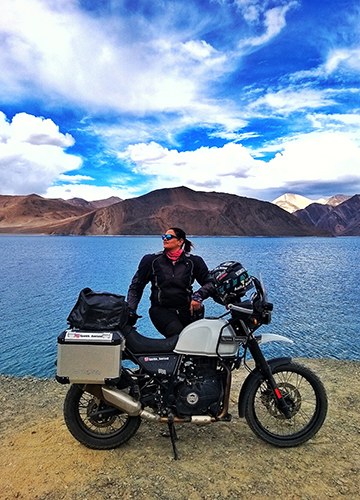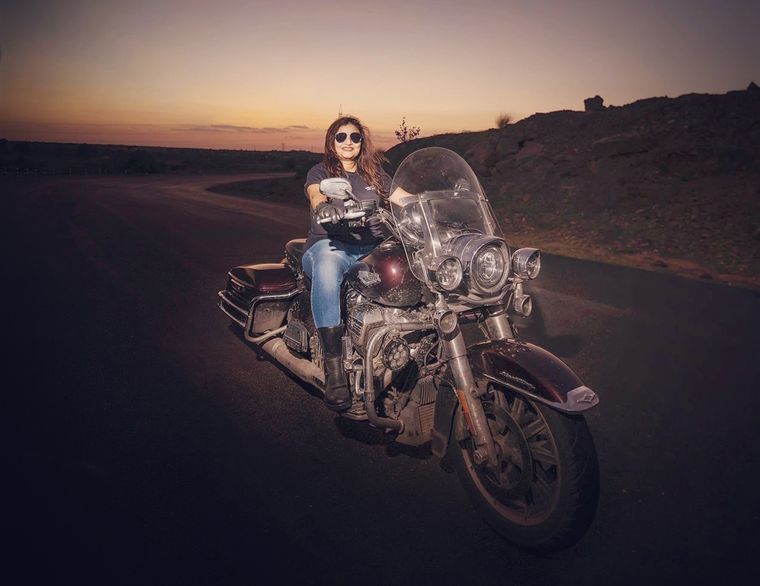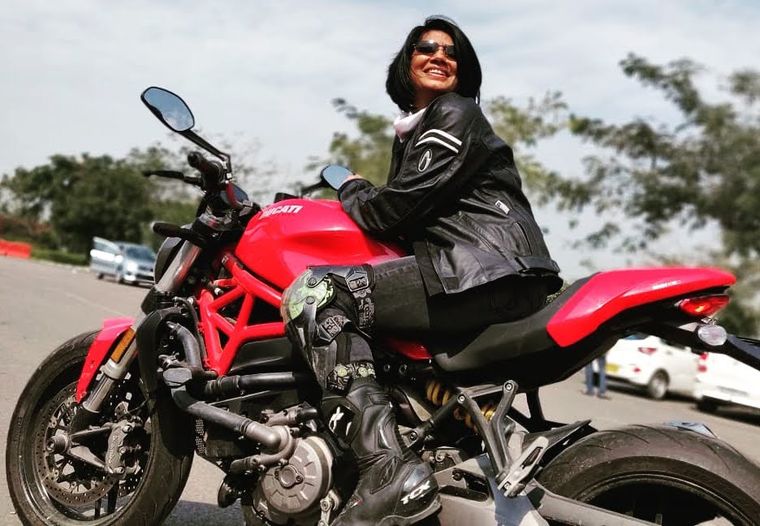Four women motorcyclists in Taapsee Pannu’s latest co-production Dhak Dhak, embark on a journey from Delhi to Leh, to reach one of the world’s highest motorable roads, Khardung La. They come from diverse backgrounds―a sexagenarian grandmother (Ratna Pathak Shah), a middle-aged mom (Dia Mirza), a 20-something Zillennial (Sanjana Sanghi) and a vlogger in her 30s (Fatima Sana Shaikh). The only thing that brings them together is a deep passion for motorcycling and the freedom it brings.
Somewhere along the Manali-Leh highway, near the picturesque village of Sarchu, is the Tsarap river. Bikers must ford this river to continue the journey. On a good day, the water level is manageable, but flash floods are common. And then, many heartbroken riders have had to let their bikes go in the relentless surge. This happens to Shaikh’s character Sky in Dhak Dhak, changing the tone of the film from cheerful to sombre.
Anita Krishnan, a rider from Mumbai, can identify with this scene. She, too, had embarked on a similar two-week journey to Khardung La with seven fellow riders. They were trying to negotiate the waters in the same way. Thankfully, none of them lost their machines, but there were ‘unforgettable life lessons’. “We were stuck in a flash flood 15,000ft above sea level for four to five hours as the river had suddenly changed course,” she says. “Usually, bikers are prepared because water-logging is not unusual on this route, but the flow was beyond what we could have imagined.”
Krishnan, 41, who is just back from a 22-day, 4,500km riding trip in Australia, says she connects with Dhak Dhak at a deeper emotional level. A fitness trainer-turned-motorcycle enthusiast with 17,000 followers on Instagram, the courage to become a biker came only after marriage, much like Dia Mirza’s character, Uzma. She took to it seriously when her mother gifted her with a Royal Enfield Bullet and told her, “Go, be on your own”.
Dhak Dhak, a breezy film about women bikers, touches a chord with those who are at the heart of the story. “The number of women bikers in India is huge and these women are riding really heavy bikes,” says Pranjal Khandhdiya of Outsider Films, which co-produced Dhak Dhak. “To get insights for the film, we connected with women biker clubs and associations that have mushroomed across the country. This is not a regular feminist film with male-bashing or feminist jingoism. It shows the viewer that there is a huge possibility that the woman next door might be passionate about motorbikes.”
The film accurately captures the passion and drive of the country’s women bikers. Take, for instance, Taruna Singh, 55, from Pune, who immediately connected with Shah’s character Mahi, who zips around on her Royal Enfield Bullet with colourful prayer flags fixed on its handlebars. “For the last 20 years I devoted myself completely to the family. It was in my 40s, when the kids had all grown up that I began to get restless, because I realised I had done nothing for myself,” she says. That is when the “freebird tomboy”, as she refers to herself, bought herself a bike. What followed were multi-state journeys with like-minded bikers. “Age is no bar for serious biking,” she says.
As an increasing number of women are taking to the Royal Enfield Bullet, Ducati, BMW, Harley Davidson and Triumph, they are correcting misconceptions. No, it is not their boyfriend’s bike. Yes, they ride on it by themselves. No, it is not too heavy to handle. For, the machine knows no gender. The deep rumble when you start, the sudden lurch when you accelerate, the wind on your hair―it is a thrill like no other, say the lady bikers. According to Bikernis, a group of lady bikers formed in 2011, around 1,600 of them have travelled over 18,500km to more than 13 countries.
Motorcycles found a way into their lives, say the bikers, before they even knew what ‘feminism’ or ‘gender bias’ meant. Of course, this does not stop men from chasing or groping them. “There is no doubt that men still feel this is their territory,” says Krishnan. “Just like Shaikh’s character Sky is eve-teased by two men on bikes when she is waiting by her bike on a highway, we have experienced it too. Once on a Goa trip, three of us were chased by this loafer on his bike making it impossible for us to drive safely. But then, we managed to shoo him away.”
Sunita Kunjeer, who in 2017 was appointed the director of ‘The Ladies of Harley India,’―an all-India group of women riding Harley Davidsons―says that the membership of women motorcyclists has increased phenomenally across the 21 chapters of HD in India. Kunjeer, 48, is one of the three Indian women in the HD Club 100 group, consisting of those who have completed one lakh kilometres on their Harleys. She says that motorcycling plays a crucial role in building grit in women. Kunjeer gifts herself a bike on every birthday. She got her first motorbike, a Royal Enfield, at the age of 17. Currently, she has an enviable collection that includes the Harley Davidson Road King M8 on which she has clocked 1.7 lakh km, a BMW R 1250 GS and an Royal Enfield Himalayan.
Women bikers say they are often asked why they do not choose the petite and slower Scooters instead? “You don’t get that ‘broooom’ sound on a Scooty, do you?” asks Jaswinder Kaur, or JK the lioness, who has over 31.7K followers on Instagram. “Also, when the engine is turned on and the speedometer starts moving, the most beautiful feeling is of freedom. The freedom to experience the unadulterated joy of the road.”
Kaur has travelled to over 20 states in India. She started when she was 18, when her father gifted her with her first bike. In 2012, when she got married, she had to stop biking. But “the bug” kept showing up repeatedly. Within months, she ended the abusive relationship and took up riding professionally. Today, Kaur is a ‘moto influencer’ who works with brands like Ducati and Suzuki, trains other women in biking and reviews “super stylish and expensive bikes”. “People know me now. I am doing this to establish my identity, not for money,” she says. These women, through their adventures, are proving that we are past the age when biking was labelled as rebellion. Today, girls just wanna have fun on their bikes.





